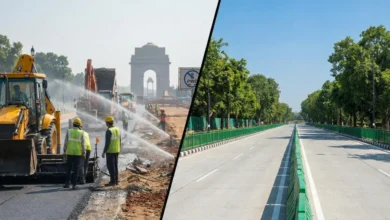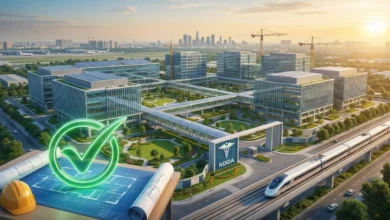Lotus 300 AOA Files Legal Notice as Flat Owners Face Registration Delays Despite Court Orders

Hundreds of homeowners in the Lotus 300 residential complex in Sector 107, Noida, are once again locked in a frustrating legal standoff, as their efforts to register their long-awaited homes have hit a fresh roadblock. The Apartment Owners Association (AOA) has formally served a legal notice to the Noida Authority, accusing officials of deliberately ignoring clear directives from India’s top courts to complete registrations without further delay.
Lotus 300, a premium housing development built by Hacienda Projects Private Limited (HPPL), has become emblematic of the NCR’s chronic real estate gridlock. Originally allotted in 2010 with a 39-month timeline, the project missed multiple deadlines, leaving buyers waiting far beyond the promised July 2017 delivery. Even as partial possessions began, many essential amenities never materialized, and hundreds of buyers were left without occupancy certificates or property titles.
In 2018, frustrated residents approached the Economic Offences Wing of Delhi Police, filing complaints of fraud, criminal breach of trust, and conspiracy against the developer. By 2019, Noida Authority had slapped HPPL with recovery notices for substantial unpaid dues. The situation worsened when courts ordered investigations into suspected diversion of funds and money laundering by the developer’s directors.
Eventually, the National Company Law Tribunal admitted the developer into insolvency proceedings in late 2022, appointing a Resolution Professional (RP) to oversee the project’s compliance and buyer claims.
After years of uncertainty, homeowners secured a major win. In February 2024, the Allahabad High Court directed the Noida Authority to begin registering flats without tying the process to any pending dues from the developer. In September 2024, the Supreme Court upheld this directive, effectively removing one of the Authority’s main justifications for withholding registries.
Following the Supreme Court order, progress finally began. Over 90 flats in towers 1 and 2 were registered last autumn. Officials appointed a nodal officer to coordinate with the Resolution Professional and the AOA to process completion certificates and documentation for the remaining towers.
However, after a brief period of progress, the process again ground to a halt.
In April 2025, the Authority issued occupancy and completion certificates for towers 3 to 6, covering more than 220 flats. Within days, dozens of buyers paid stamp duty—reportedly amounting to around ₹5 crore—to secure their registrations.
But instead of continuing the process, officials requested further verifications from the Resolution Professional, insisting on fresh documentation before proceeding. According to the AOA, all requested papers were submitted by June 24, yet no action followed.
AOA President Bhuwan Chaturvedi says repeated visits and written reminders to the Authority have yielded no results. “Despite the Supreme Court’s explicit directions, they are inventing new procedural excuses to avoid registering our flats,” he said. “This is deliberate harassment of law-abiding homeowners.”
The association’s legal notice warns that if the Authority continues to delay, it will move to file contempt proceedings in the Supreme Court. Such a step could lead to serious penalties against Noida Authority officials personally responsible for enforcement.
Noida Authority representatives have rejected accusations of bad faith. Officials insist the delays are meant to prevent any possible fraud or irregularity in verifying genuine buyers and occupancy records. “We are not defying the courts,” said an official who declined to be named. “The verification process is critical to ensure clarity on all documents.”
However, buyers argue this is nothing but an excuse to slow-walk a process the courts have already unambiguously cleared. Many homeowners have spent over a decade without registered property titles, despite paying nearly the full cost of their homes.
For residents, the inability to register their flats has created a cascade of problems:
- No legal ownership: Until registration happens, they cannot sell, mortgage, or fully insure their properties.
- Financial losses: With unregistered flats, resale value remains suppressed, and buyers risk additional tax and legal complications.
- Emotional strain: Years of uncertainty have taken a toll on families who simply wanted secure homes.
While a portion of buyers in towers 1 and 2 finally completed registration, the AOA says the same process should now be automatically extended to all remaining flats. “Everything was verified months ago,” said one resident, requesting anonymity. “They are making us relive the trauma all over again.”
The Lotus 300 stalemate is hardly an isolated episode. Across Noida and Greater Noida, numerous stalled or partially completed projects face similar conflicts: authorities trying to recover dues from bankrupt builders while innocent homeowners are left in limbo.
Experts say this situation highlights a serious policy gap. While it is legitimate for authorities to recover public funds owed by developers, courts have repeatedly clarified that such recovery cannot override citizens’ property rights.
“Courts have consistently held that buyers’ rights must take precedence over unpaid dues,” said a senior advocate familiar with the matter. “The Supreme Court has already set clear directions here. Any further delay is risking contempt.”
The AOA’s notice is a formal precursor to a contempt petition, which could result in strict directions or penalties. Simultaneously, Noida Authority may attempt to file a review petition, although legal observers say chances of success are slim given the clarity of previous orders.
Meanwhile, buyers are hoping that continued pressure and media scrutiny will finally break the impasse. Some families have indicated they will stage protests if registrations do not start within the next few weeks.
After more than a decade of delays, Lotus 300 homeowners are determined to see the process through. For them, this is not just about paperwork—it’s about achieving a sense of security and dignity in their own homes.
“This should not be so hard,” said Chaturvedi. “We have done everything required by law, paid all dues, obtained all clearances, and secured court orders. The only thing left is the will to implement them.”
As the stalemate drags on, Lotus 300 has become a cautionary tale—highlighting how even landmark court judgments can fall short if enforcement remains slow. For thousands of homebuyers across India, this battle underscores a broader question: When will their homes truly become theirs in the eyes of the law?





